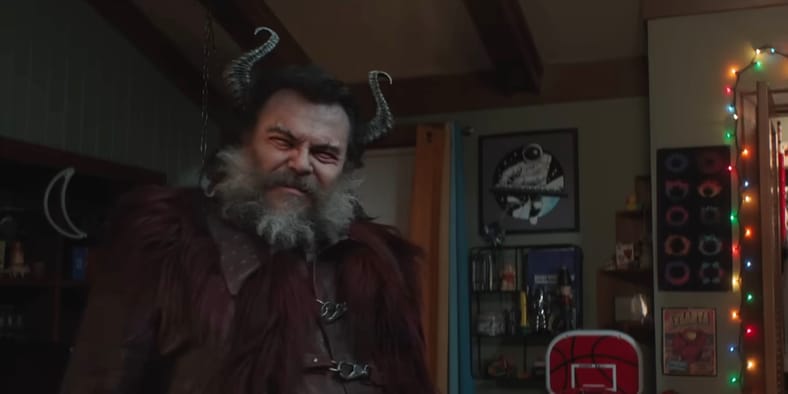
Here's ads banner inside a post
Are Christmas Movies Doomed? ‘Red One’ And The Real Reason We Don’t Take Them Seriously Anymore
Christmas movies have long been a staple of holiday traditions, offering a sense of nostalgia, comfort, and festive cheer. From the heartwarming tales of It’s a Wonderful Life to the laugh-out-loud antics of Home Alone, these films have captured the magic of the season for decades. Yet, in recent years, something has shifted. The once-sacred genre seems to be losing its spark, and films like Red One are quickly becoming symbols of why Christmas movies no longer carry the same weight or impact they used to.
But what happened? Why are Christmas movies—once revered as heartwarming celebrations of the season—now so often dismissed as shallow, over-the-top, or downright forgettable? Let’s explore the deeper reasons behind the decline in the genre’s perceived value, using Red One and its ilk as a starting point for understanding this cultural shift.
Here's ads banner inside a post
The Rise of ‘Red One’: A New Era for Christmas Films?
Red One, released in late 2024, is a high-profile Christmas movie that attempts to blend action, comedy, and holiday cheer in a way that hasn’t been seen before. Starring Dwayne “The Rock” Johnson and Chris Evans, the film draws inspiration from a Christmas-themed superhero action adventure, set in a world where Santa Claus is reimagined as a global, high-tech operation. The film’s tone is irreverent, often pushing boundaries in its attempt to cater to a more modern, action-oriented audience.
While Red One has its share of entertaining moments and big-budget spectacle, it encapsulates the changing landscape of Christmas movies—one that is increasingly more focused on spectacle and novelty rather than emotional resonance, nostalgia, or meaningful holiday messages. Is this what audiences want? Or are they craving something different?

Here's ads banner inside a post
The Over-Saturation of Christmas Movies
One major factor contributing to the decline in the cultural weight of Christmas films is the sheer over-saturation of the genre. Every holiday season, Netflix, Hallmark, and other streaming platforms churn out countless new Christmas films. This flood of content has left audiences feeling overwhelmed and, perhaps more importantly, desensitized to the magic that once made Christmas movies special.
For many years, Christmas films had a limited window of opportunity to captivate audiences. There were only a handful of them, and each one carried a certain weight. Home Alone and The Polar Express weren’t just movies—they were events. Now, with streaming services constantly pushing out new holiday content, it’s difficult to find anything that feels truly unique or impactful. And Red One is a prime example of this—it’s a movie designed to be part of the Christmas media machine, not one that feels like a genuine reflection of the season.
Rather than being an annual event to look forward to, Christmas movies have become just another genre that audiences feel obligated to consume, much like a holiday chore. This has led to a reduction in their perceived value, and Red One is a perfect representation of this shift: an attempt to make a “holiday blockbuster,” rather than a film that offers a deeper, timeless connection to the spirit of Christmas.
The Shift Toward Commercialization and Pop Culture Tropes
Another reason why Christmas movies are losing their seriousness is the increasing commercialization and reliance on pop culture tropes. Take Red One as an example: the film attempts to blend Christmas themes with action movie elements, superhero motifs, and a ton of star power. It’s clear that this movie wasn’t made for the purpose of conveying a heartfelt holiday message—it was made to sell tickets and merchandise.
This shift in priorities is not limited to Red One. Many Christmas movies now feel like they exist to sell products, promote brands, or serve as platforms for popular actors. Think of the many Hallmark and Lifetime films that rely on the same predictable formula year after year, where the plot is secondary to the Christmas aesthetic and the need to sell a certain image of the holiday season.
When Christmas films are more concerned with capitalizing on trends and celebrity culture, they lose the emotional core that once made them memorable. The magic of the season—capturing the warmth, love, and togetherness of Christmas—often takes a backseat to cheap thrills, action sequences, or the desire to fit into the next viral trend.

Nostalgia’s Decline and the Search for New Holiday Narratives
Part of what made Christmas movies so beloved in the past was the sense of nostalgia they evoked. Films like A Christmas Story, Miracle on 34th Street, and The Grinch Who Stole Christmas weren’t just stories—they were yearly traditions that transported audiences to a simpler, more magical time. The holidays were about family, reflection, and shared moments of joy. And these films became symbols of those values.
However, with the rise of films like Red One, there’s a noticeable shift away from the nostalgic traditions of Christmas cinema. Many modern holiday films, especially those targeting younger audiences, focus more on spectacle, novelty, and pushing boundaries than on capturing the true essence of the season. The result is a growing disconnect between the expectations of viewers and what these films offer. What once felt like a heartfelt tribute to the holiday spirit now feels like an overstretched marketing campaign.
The Pressure to Innovate—and the Risks of Losing Tradition
There’s an understandable pressure in Hollywood to innovate and reinvent, particularly in the genre of Christmas movies, where audiences might feel like they’ve seen it all. But while innovation can be exciting, it also carries risks. Red One and its ilk may appeal to a younger, more action-oriented audience, but they risk alienating the very people who love Christmas movies for their heart, warmth, and nostalgia.
The formula for success in Christmas movies has always involved a delicate balance between innovation and tradition. In the past, films like The Santa Clause and Love Actually found new ways to celebrate the season without losing sight of the heartwarming messages that make these films timeless. But Red One seems to go too far in the other direction, prioritizing modern action tropes over the emotional resonance that people associate with Christmas. This shift is what makes it hard for many to take contemporary Christmas films seriously anymore.
Is There Hope for Christmas Movies?
Despite the rise of films like Red One, all is not lost for the genre. Christmas movies can still recapture the magic and meaning that made them beloved in the first place—but it will require a return to what made them special: heart, warmth, and a sense of shared human experience. Audiences still crave those moments of connection, where family bonds are celebrated, lessons are learned, and magic is found in the most unexpected places.
A return to storytelling rooted in these timeless elements could reinvigorate the genre. There’s still room for innovation, but it needs to be balanced with a genuine reverence for what the holiday season represents. Red One may be a fun diversion, but it highlights a deeper problem in the genre—a lack of sincerity and emotional depth. If Christmas films are to reclaim their place as a genre that people truly take seriously, they’ll need to rediscover the heart of Christmas and stop relying on flashy gimmicks and star power to sell the season.

